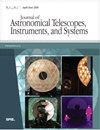Radiation effects on scientific complementary metal-oxide-semiconductor detectors for x-ray astronomy: II. Total ionizing dose irradiation
IF 3.1
3区 工程技术
Q2 ENGINEERING, AEROSPACE
Journal of Astronomical Telescopes Instruments and Systems
Pub Date : 2024-04-01
DOI:10.1117/1.jatis.10.2.026001
引用次数: 0
Abstract
Complementary metal-oxide-semiconductor (CMOS) detectors are a competitive choice for current and upcoming astronomical missions. To understand the performance variations of CMOS detectors in the space environment, we investigate the total ionizing dose effects on custom-made large-format X-ray CMOS detectors. Three CMOS detector samples were irradiated with a Co60 source with a total dose of 70 and 105 krad. We test and compare the performance of these detectors before and after irradiation. After irradiation, the dark current increases by roughly 20∼100 times, and the readout noise increases from 3 e− to 6 e−. The bias level at 50 ms integration time decreases by 13 to 18 digital number (DN) at −30°C. The energy resolution increases from ∼150 to ∼170 eV at 4.5 keV at −30°C. The conversion gain of the detectors varies for <2% after the irradiation. Furthermore, there are about 50 pixels in which bias at 50 ms has changed by more than 20 DN after the exposure to the radiation and about 30 to 140 pixels in which the readout noise has increased by over 20 e− at −30°C at 50 ms integration time. These results demonstrate that the performances of large-format CMOS detectors do not suffer significant degeneration in space environment.用于 X 射线天文学的科学互补金属氧化物半导体探测器的辐射效应:II.总电离剂量辐照
互补金属氧化物半导体(CMOS)探测器是目前和即将进行的天文任务的一个有竞争力的选择。为了了解 CMOS 探测器在太空环境中的性能变化,我们研究了总电离剂量对定制大尺寸 X 射线 CMOS 探测器的影响。三个 CMOS 探测器样品分别接受了总剂量为 70 krad 和 105 krad 的 Co60 源辐照。我们测试并比较了这些探测器在辐照前后的性能。辐照后,暗电流大约增加了 20∼100 倍,读出噪声从 3 e- 增加到 6 e-。在-30°C 时,50 毫秒积分时间的偏置水平降低了 13 至 18 个数字(DN)。在 -30°C 温度下,4.5 keV 的能量分辨率从 150 eV 增加到 170 eV。辐照后,探测器的转换增益变化小于 2%。此外,约有 50 个像素在 50 毫秒的偏压变化超过 20 DN,约有 30 至 140 个像素在 50 毫秒的积分时间内,读出噪声在-30°C 下增加了 20 e- 以上。这些结果表明,大尺寸 CMOS 探测器的性能在空间环境中不会出现明显退化。
本文章由计算机程序翻译,如有差异,请以英文原文为准。
求助全文
约1分钟内获得全文
求助全文
来源期刊

Journal of Astronomical Telescopes Instruments and Systems
Engineering-Mechanical Engineering
CiteScore
4.40
自引率
13.00%
发文量
119
期刊介绍:
The Journal of Astronomical Telescopes, Instruments, and Systems publishes peer-reviewed papers reporting on original research in the development, testing, and application of telescopes, instrumentation, techniques, and systems for ground- and space-based astronomy.
 求助内容:
求助内容: 应助结果提醒方式:
应助结果提醒方式:


